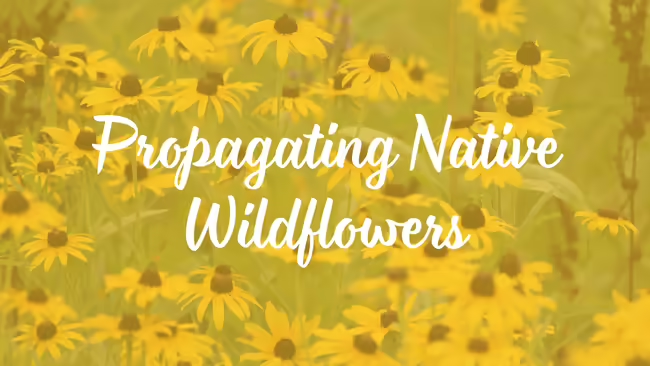
The global decline in insect populations is well documented. How can we, as individual homeowners contribute to efforts to combat the shrinking pollinator populations? Join the East Central Illinois Master Naturalists and volunteer John Marlin for Propagating Native Wildflowers: Providing Habitat and Resources for Bees and Other Pollinators on Tuesday, September 12 at 7 p.m. in the Champaign County Extension Auditorium, 801 N Country Fair Dr., Champaign, IL 61821.
We have been exposed to the idea of integrating pollinator-friendly gardens and small plantings into our yards, parks, and other areas. Native wildflowers are the plants of choice because of their abundance of nectar and pollen and other traits such as low maintenance, generally free of pests, and drought tolerance. This presentation will look closely at growing specific pollinator-friendly wildflower species, illustrated with photos of various growth stages. A focus will be given to planting in urban areas where public acceptance and landscaping regulations are important considerations. Techniques for improving success will be shared, along with suggestions on managing aggressive native species. Selected combinations of native plants and the number of bee species they might support will be discussed.
John Marlin (Master Naturalist 2010) has grown woodland wildflowers for over 40 years. He specialized in the study of Hymenoptera (bees, wasps, ants, and others) at the Prairie Research Institute until his retirement in 2010. He was the founding executive director of the Prairie Rivers Network, dedicated to protecting and restoring our rivers and returning healthy soils and diverse wildlife to our lands. He worked on several projects aimed at state and federal water policy. For example, he began the Corridors for Tomorrow Project to plant native species along Illinois highways, an effort subsequently taken over by IDOT. He also initiated the Illinois scrap tire and mosquito regulations and legislation which helped to clean up millions of tires littering the state and slowed the spread of the Asian Tiger Mosquito and other disease vectors. He is currently working on woodland and prairie planting strategies to promote bees and other pollinators in urban and other locations.
College of Agricultural, Consumer and Environmental Sciences University of Illinois, U.S. Department of Agriculture, and local Extension councils cooperating. University of Illinois Extension provides equal opportunities in programs and employment.